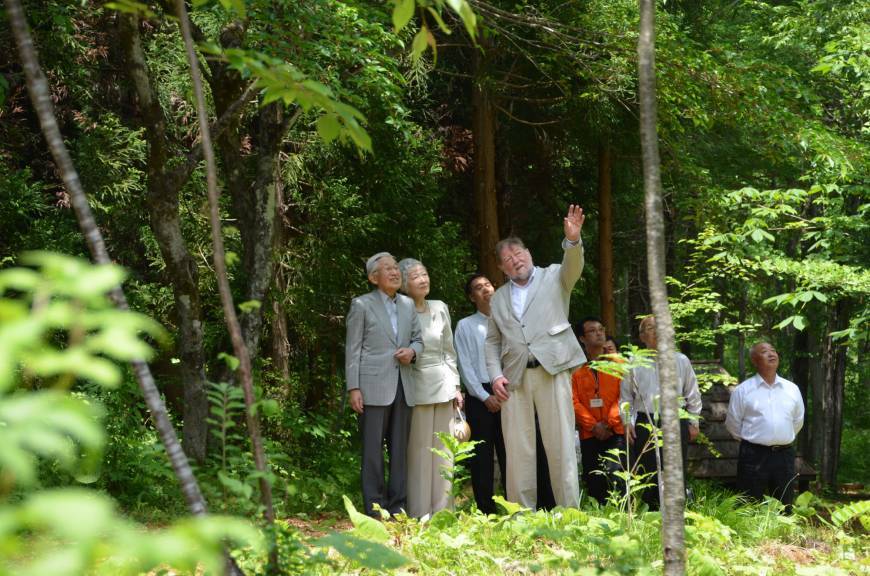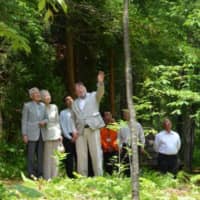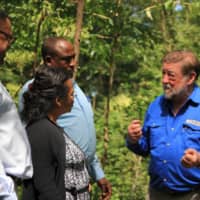Author and naturalist C.W. Nicol died on Friday after being diagnosed with cancer in 2016. As a long-standing contributor to The Japan Times, we asked his editor throughout, Andrew Kershaw, to write a few words in memory of the award-winning conservationist.
Just over a week ago, I was sitting at my desk at home typing out the final installment of Old Nic’s Notebook for publication in The Japan Times on Monday, March 30. I received the handwritten story by fax from his wife, who had collected it from reception at a hospital in Tokyo where visitors were banned because of COVID-19. In there, C.W. Nicol — or "Nic," as he preferred to be called and who was never quite “up to speed” with tech — was champing at the bit to get back to their house in the wooded hills of northern Nagano Prefecture.
It was a bright, sunny day then, and it is now. But this time as I sit here, it’s to write a few inadequate paragraphs of my own to mark the passing, on April 3, of a colleague whose Notebook I edited from the first — a fascinating story titled “Why do forests flourish on fish?” published on June 6, 2002 — all the way through to that final installment, “We live in neither East nor West.”
Almost from the start, though, Nic was far more a friend than a colleague. Already quite a celebrity in Japan by the time our paths crossed, he had been a familiar face on television through the nature and travel programs he had made. He’d even had five minutes of fame as a popular singer, though nothing could compare with him in full voice, or caressing a lament, in the company of family and friends.
Besides his gifts as a musician, he seemed to have remembered every song, joke and limerick he’d ever heard — and to have made up countless others. He was an accomplished artist and chef, too, and he really did love writing.
Through his many books, one such as I who only figured in the last quarter of his life could marvel at Nic’s truly amazing progress through the world. For “a poor lad from Neath,” as the ever-proud son of South Wales (notwithstanding his prized Japanese passport) would refer to himself, he certainly found exciting ways to fill his time. Not content with joining the first of his Arctic research expeditions while still in his teens, as a wildlife ranger he set up Ethiopia’s first national park a few years later. Then he was off conducting fisheries research for the government in Canada, sailing on a Japanese whaling ship in Antarctic waters, and all the while honing his black belt skills in karate — the passion that drew him to Japan for the first time in 1962.
However, besides the Afan Woodland Trust he established near his home in Kurohime in 2002, and about whose conservation and community work he often wrote in his Notebook, I’m sure the doughty campaigner in him was most delighted to have battled through the thickets of bureaucracy and the undergrowth of vested interests as the driving force behind the brand-new, all-wood Miyanomori Elementary School in Higashi-Matsushima, Miyagi Prefecture, which finally opened in January 2017.
The genesis for that lay in the long-standing programs the Afan Trust runs giving traumatized or disadvantaged children from that area a taste of freedom in nature. So, when the 2011 tsunami destroyed the elementary school there, to Nic it was only natural to step forward with plans, and lots of funding he sourced, for a replacement sited safely on a hillside with woods nestled behind it.
Likely because of his many such activities, Nic had been chosen to carry the Olympic torch on part of its relay through Nagano Prefecture. Yet even with the games postponed, I'm sure there was another baton he still passionately wished to pass on. It was for those in charge of Japan's vast tracts of publicly owned forests to start following the pioneering lead of the C.W. Nicol Afan Woodland Trust in fostering the sustainable productivity and increasing biodiversity of those wonderful natural resources — and making them available to enrich people's lives in so many ways.
While it is easy to reel off Nic’s astonishing achievements, it’s much harder to describe the fiercely loyal, warm-hearted friend now gone — a large man with a craggy face that belied his deep humanity. It’s that, his impish sense of humor and his wealth of larger-than-life true stories, that will always stay with me.
It has been a pleasure and a privilege to have shared a little in Nic’s life for nearly two decades, and my thoughts are now with his family and many dear friends and colleagues.
“Yours, aye, Nic” ... as he signed off every mail, including that accompanying his final Notebook. Back then, just so recently, he was eagerly looking forward to getting home to Kurohime with “A new life to sort out!” and a half-written magnum opus to complete.
C.W. Nicol's 18 years of contributions to The Japan Times can be read here.




















With your current subscription plan you can comment on stories. However, before writing your first comment, please create a display name in the Profile section of your subscriber account page.